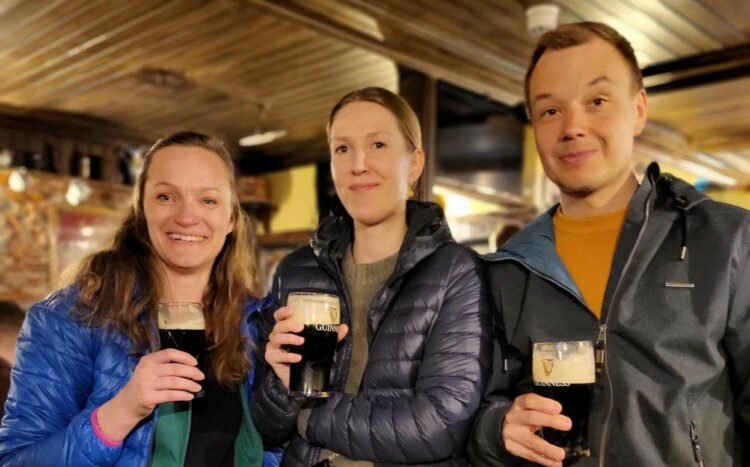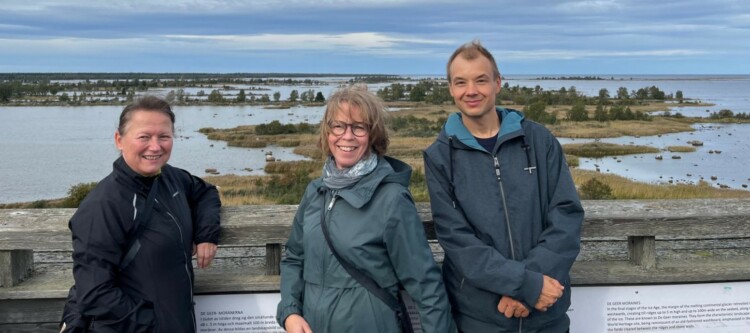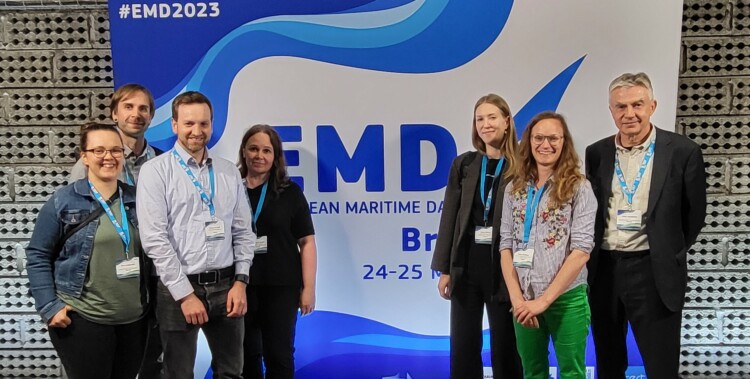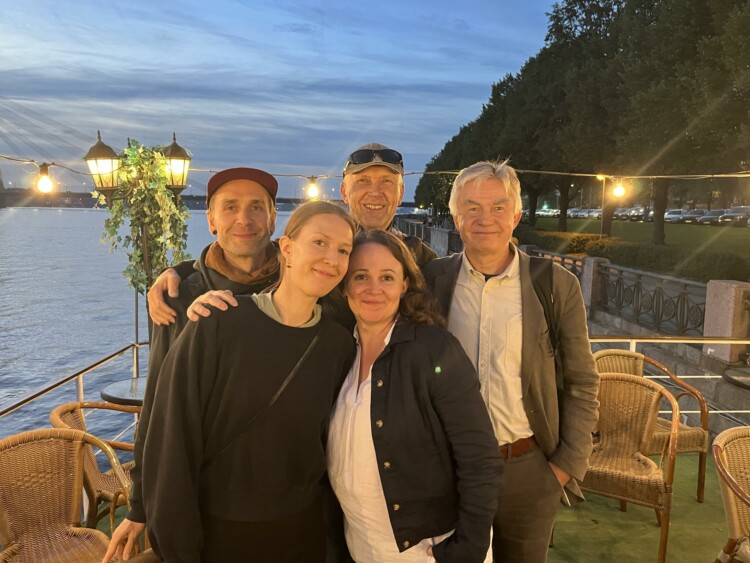Get familiar with the team coordinating the Finnish MSP cooperation and its activities
The MSP cooperation between the coastal regional councils and the collaboration between marine sectors, experts and authorities is carried out by a team of a few people, commonly known as the MSP cooperation coordination team. This team collects and analyzes information relevant to MSP to support the planning process and organises meetings between planners and stakeholders aiming to build shared vision for the sustainable use of the marine area in the future. The work provides a great opportunity to play an important role in the preparation of the Finnish Maritime Spatial Plan.
Coordination of the MSP cooperation is carried out between a coordinator, a planner and project planners of international MSP projects. Administratively, the team is based in the Regional Council of Southwest Finland, but the team works equally for all eight coastal regional councils. The coordination of the MSP cooperation is funded by the national EMFAF program.
A unique vantage point on a challenging seascape
MSP has a wider geographical and thematic scope than any other land-use planning cooperation in Finland. The priorities and challenges of MSP vary from region to region. “Finding a common vision for the sustainable use of the marine area that takes into account regional and even local characteristics requires long-term coordination of cooperation not only between planners but also between the marine sectors,” says Mari Pohja-Mykrä, Coordinator of the MSP cooperation, who is pulling all the strings considering networks and themes related to MSP.
Vesa Arki, Project Planner, has been responsible for the MSP-GREEN -project covering all European sea basins, which has identified how MSP can support the European Green Deal. “I like the opportunity to work with complex environmental and natural resource related challenges as the identified solutions can have real impacts on the well-being of nature and people. There are rarely any correct answers to the questions, but rather solutions are informed by societal values and the experiences of individuals and communities. In the context of the European Green Deal, I want to emphasise the importance of equity and inclusion of stakeholders. This theme has been highlighted, for example, through our work with the fishing sector.”
Roosa Mikkola, Project Planner, is responsible for the Baltic Sea2land -project focusing on the Baltic Sea region. According to Roosa, her work combines many things she enjoys: “thematic substance, internationality and being up-to-date on current issues”. The project aims to strengthen the consideration of multi-level governance in the planning of marine areas and coastal zones. Through pilot cases, the project looks at issues such as the reconciliation of offshore wind energy development with migratory fish, and the addition of the blue-green network into MSP.
Laura Pietilä, Project Planner, has already been involved in several projects: she started her work in the eMSP NBSR -project focusing on the Baltic and the North Sea areas and is involved in both MSP-GREEN and Baltic Sea2Land projects. “What fascinates me most about this work is how the many different challenges faced by our society intertwine in MSP. The themes we focus on range from security of supply to marine nature conservation and social justice, which makes the work interesting, and you are constantly learning new things,” says Pietilä. Laura has had a particular responsibility for marine multi-use, which is one of the cross-cutting themes of the on-going second planning cycle.
The latest addition to the team is Timo Rantanen who works as the Planner of MSP cooperation. “MSP requires a spatial and holistic approach and MSP cooperation must take into account the different perspectives and actors involved. Succeeding in this is challenging, but it’s a task well suited for a geographer,” Timo reflects. Timo is responsible for organizing the planning cooperation between the MSP planners from the regional councils, leading the cooperation of the geospatial MSP experts and data management of planning related resources.

Picture. Roosa, Laura and Timo on an evening break in Ireland after the transnational workshop in spring 2024.
Reconciling various activities and objectives forms the core of the work
MSP requires an interdisciplinary approach. The marine systems are complex and there are multiple, often conflicting, interests related to the use of marine areas. To ensure sustainable and equitable use of marine space, a wide range of expertise from many different backgrounds is needed. The current MSP cooperation team is formed by a humanist, two biologists and two geographers. In addition to their thematic specialisations, the work requires negotiation and people skills in general.
“There are many different objectives and values connected to marine areas, and we must keep our minds open to different perspectives and needs. The importance of bridging the gaps between sectors and meeting people is highlighted in our everyday work. I think that working in MSP foremost teaches people to listen,” says Vesa.
The work broadens our understanding of issues related to the use of the marine space and how difficult it is to take into account different perspectives equally. The feeling of accomplishment often comes precisely from the experiences on successful collaboration. According to Roosa, “the best part of the work is when stakeholders praise the work that we have done”. Timo also emphasises the importance of successful planning cooperation: “I have felt proud, especially when a workshop has been successful, and we have made progress on the topic of the day together. It also feels good when all the MSP planners have gathered around the planning table and the cooperation is running smoothly.”

Picture. Timo meeting MSP planners Christine and Ann from the Regional Council of Ostrobothnia in the Quark archipelago on the 18th of September 2024.
Desires for the future; resources and commitment
The coordination of MSP cooperation requires resources. Mari will continue to promote national and international project cooperation to bring current and up-coming issues into the MSP process and to network with stakeholders and colleagues. The whole team looks forward to a well-resourced MSP in the future, which can contribute to the good status of the marine environment, social well-being, and support the societal resilience in the face of many current and future changes and challenges.
MSP is in a unique position to take a holistic overview of the future of marine areas. This work is supported by a strong and comprehensive knowledge-base, which will be used to inform the planning process. In turn, raising awareness on MSP and the plan itself is crucial in ensuring that organizations working on themes related to marine nature and marine industries are committed to the MSP plan and its implementation in their respective sectors. The effectiveness of the MSP cooperation is currently being tested as the update of the Finnish Maritime Spatial Plan 2030 is ongoing. The Vision phase of the second planning cycle will be done in strong stakeholder cooperation during 2025. The new maritime spatial plan will be completed by 2027.
The Ministry of the Environment is responsible for intergovernmental cooperation and for the overall development and guidance of MSP in Finland. “Planning cooperation will become more international in the future, which will further enhance the importance of the cooperation with the Ministry of the Environment. Are we possibly moving towards a common strategic level maritime spatial plan for the Baltic Sea?”, Mari reflects on the possible developments for the coming years.

Picture. Vesa, Mari, Laura and Roosa at the European Maritime Days 2023 together with Elina from the Regional Council of Kymenlaakso, Gustav from the Regional Council of Ostrobothnia and Heikki from the Regional Council of Southwest Finland.
What is it like in practice to work at the MSP cooperation coordination team?
According to the team, MSP cooperation can be described as meaningful, multi-dimensional, challenging, inductive, flexible, fast-paced, and busy. It includes travelling domestically around the coast and internationally, especially in the Baltic Sea but also to the other European sea basins. And you should not forget networking through workshops, lunches, and excursions. There are both remote meetings and onsite events. Moderation and facilitation, presentations, and panel discussions are common. Taking notes and preparing summary reports, map presentations and StoryMaps. Learning and listening, managing a holistic vision of the future of the marine realm. Some of the most memorable moments are born in the encounters with stakeholders and colleagues.
“We organised two project workshops that brought together MSP experts from all over Europe to Finland. I feel that we succeeded in creating a friendly, interested, and respectful atmosphere, which not only supported the achievement of good results from the workshop but also increased trust between the project partners and eased future cooperation. These encounters are also maybe the key source of happiness we experience at work,” says Vesa.
Laura says, “One experience that has sticked to my mind is, when last spring I went to interview a professional fisherman in Rauma for our workshop focusing on nature-inclusive design. This was an interesting assignment, because I got to see the fishermen’s working environment and the realities of their everyday work at the Bothnian Sea.”
“Altogether, we have had a kind and knowledgeable team involved in the organizing of the MSP cooperation over the past years. Becoming proficient at MSP cooperation coordination takes time; this is the kind of profession you do not learn in school – it is something you grow into through dialogue with planners and stakeholders”, Mari sums up.
Are you interested in joining the team? We will continue to participate in international projects in the future. New projects will open opportunities for new people to join the coordination team. Follow our website and social media channels to get information about upcoming vacancies.

Picture. From left to right Vesa, Laura and Mari together with Timo and Heikki, MSP planners from the Regional Council of Southwest Finland, in Riga after the MSP-GREEN Baltic Sea workshop on the 17th of September 2024.
Postscript: After the MSP-GREEN project concluded in October 2024, Vesa Arki moved on to work at Traficom. The MSP cooperation coordination team wishes Vesa all the best in his new career!
